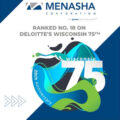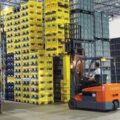ORBIS, an international manufacturer of reusable plastic packaging, has maintained its growth in the European market despite an economically challenging 2022. “We have developed our customer base as well as our organization,” said Jürgen Krahé, Senior Commercial Director EMEA. “Through regular collaboration with our customers and partners, also at events such as FachPack and The Battery Show, we continue to focus on customer needs. That helps us to optimize our product portfolio with the customer in mind,” he added.
In 2002, ORBIS Europe joined ORBIS Corporation and has led the EMEA region ever since. ORBIS’ parent company, Menasha Corporation, is one of the oldest family-owned manufacturers in the United States (since 1849). With durable, supply chain-optimized product design, ORBIS’ customized and standard solutions help streamline the flow of products sustainably throughout the supply chain. Large plastic collapsible containers (FLC), pallets and small load carriers are 100% recyclable.
ORBIS has expanded its European footprint by opening a new distribution center and offices in Ieper, Belgium. The center is especially dedicated for packaging solutions such as battery transport, as well as serving as a clean space for packaging assembly and storage. The offices, in turn, provide assistance to customers who have requested it, and support the financial, purchasing and logistics departments, among others.
Last January, ORBIS Europe inaugurated a new satellite platform for storing containers in Ieper, Belgium. This location represents a key delivery point for the company’s customers and is intended to meet their demands.
One of the objectives for 2023 is to introduce proven products in other geographic and vertical markets. Customer-specific packaging solutions are currently in the prototyping phase. “We already cover the growing demand for sustainable transport packaging with our existing product portfolio. In addition, we are working to increase the percentage of recycled material in our products and evaluate alternative materials,” Krahé concluded.









